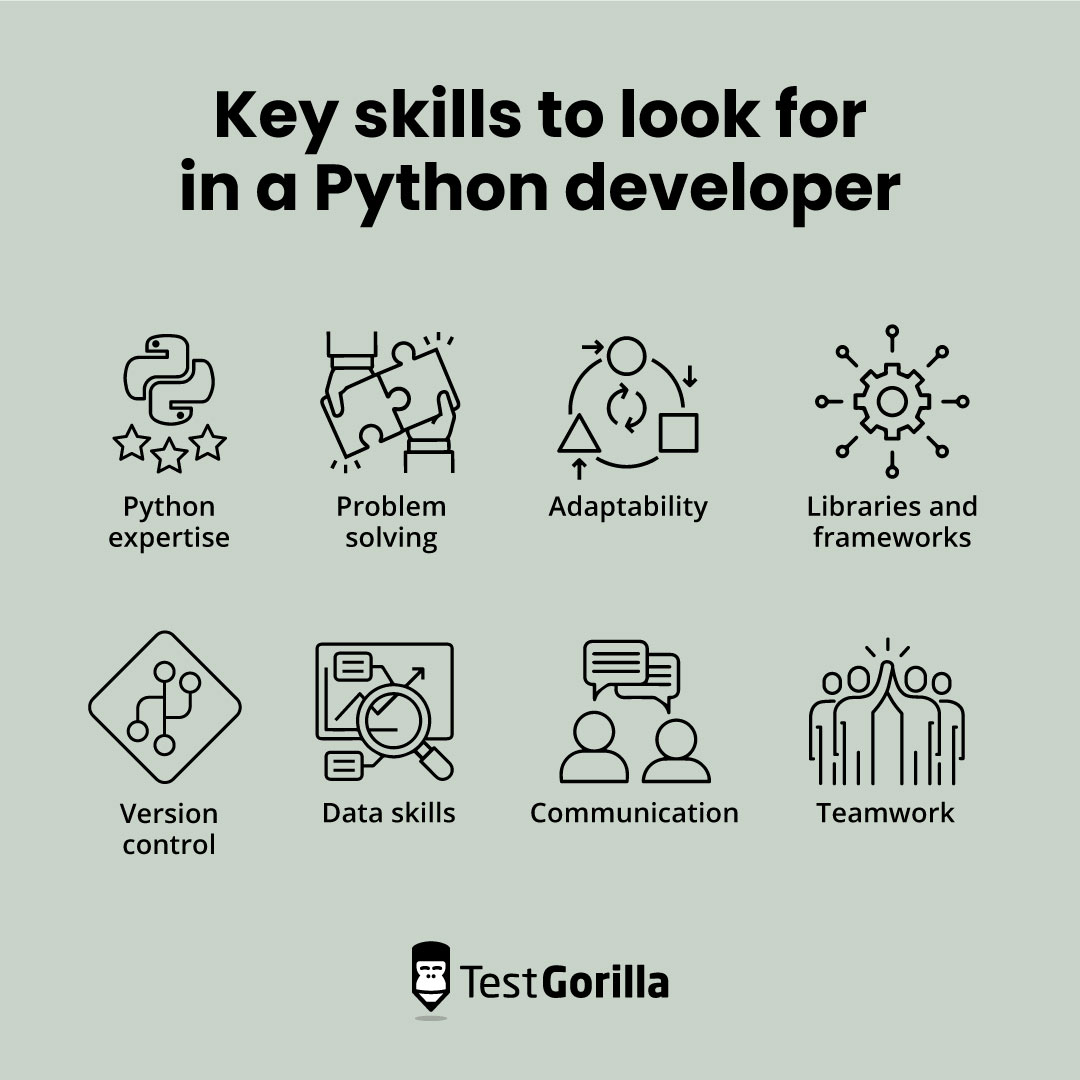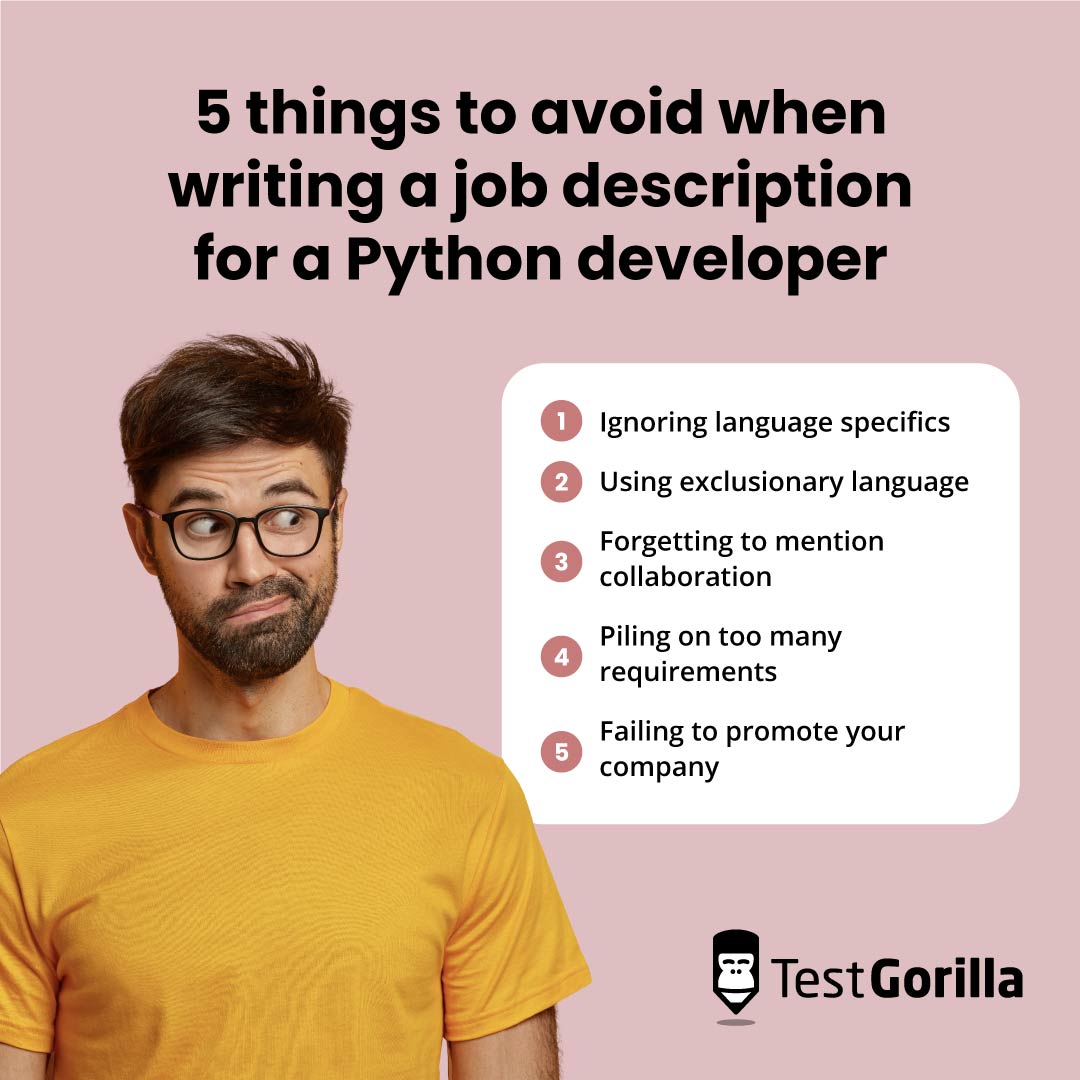Hiring a strong Python developer starts with your job description. But unfortunately, job descriptions are often too vague or outdated, attracting unqualified candidates or missing the modern skills companies actually need.
This can lead to any number of issues – including failing to attract top talent and instead luring in candidates who will mismatch with your company culture or set back your projects. That’s why a focused and well-crafted job description is crucial.
In this article, we’ll explain how to write an accurate and engaging Python developer job description that reflects your company’s needs, stays ahead of industry trends, and attracts the skilled candidates you're looking for.
Table of contents
- What is a Python developer?
- Key skills to look for in a Python developer
- How to write an effective Python developer job description
- Python developer job description template
- 5 things to avoid when writing a job description for a Python developer
- Next steps: Attracting and assessing Python developer candidates
- Python developer job description FAQs
- Get the best Python developers with TestGorilla
What is a Python developer?
Python developers are experts in using the Python programming language for a wide range of software projects. They develop software applications, analyze data, and automate processes, and they frequently work in fields like:
Web development, where they design websites and web applications
Data analysis, focusing on drawing valuable insights from complex data sets
Finance, employing Python to create algorithms for quantitative research
Game development, using their skills to build interactive games
Key skills to look for in a Python developer
Finding the right Python developer means focusing on the skills that matter. Here’s what to watch for:
Python expertise: A deep understanding of the Python language is non-negotiable.
Problem-solving: Writing code is about solving problems. Your hire needs to think critically.
Adaptability: Technology evolves. Your candidate should show a willingness to adapt and learn new tools or libraries.
Libraries and frameworks: Knowledge of popular Python libraries (like Pandas, NumPy) and frameworks (like Django, Flask) is beneficial.
Version control: Familiarity with Git can help developers manage changes and collaborate with other developers.
Data skills: Depending on the role, skills in data manipulation or analysis may be crucial.
Communication: They’ll need to explain complex technical issues in an easy-to-understand manner, so communication skills are important.
Teamwork: Often, Python developers are part of a larger team, so being a good team member is a big plus.
The best insights on HR and recruitment, delivered to your inbox.
Biweekly updates. No spam. Unsubscribe any time.
How to write an effective Python developer job description
Creating a strong job description for a Python developer isn't about including a laundry list of industry buzzwords, which can confuse candidates and dilute the focus of the role. Instead, it's about capturing the essence of the role while succinctly demonstrating your company's culture. This will attract candidates who are not only skilled but also a good fit for your business. Here's what to consider.
The role: Understand what a Python developer does in your specific context. Are they focusing on web development, data analytics, or automation?
Project types: If you’re developing an e-commerce site or an internal tool, mention it. Candidates should know what kinds of projects they will work on.
Technology: Clearly mention the tools and technologies the candidate should be familiar with. For Python developers, this could include specific frameworks like Django or Flask and databases like SQL or MongoDB.
Skill level: Is this an entry-level or a senior position? Be clear about experience levels so you attract candidates who match your needs.
Soft skills: Don’t just focus on technical skills. Mention the importance of problem-solving, communication, and adaptability.
Company perks: Showcase what makes your company a great place to work. Do you offer learning and development programs or flexible working hours?
Laws and regulations: Make sure the job description complies with employment laws to avoid any legal issues down the line. Specifically, use unbiased language that doesn’t unfairly exclude qualified candidates.
Python developer job description template
This Python developer job description template offers a comprehensive outline. Modify it to fit your company’s specific needs. Make sure the description aligns with your company’s policies, current technology, and culture.
Company introduction
Provide a quick snapshot of your company, outlining its mission, core values, and the kind of culture you've built. Showcase the work environment and any unique benefits that set you apart as an employer.
Also, explain why you're in the market for a Python developer and how this specific role aligns with your company's broader objectives.
Python Developer job brief
[Company name]
Job Title: [For example, Senior Python Developer, Python Developer, or Junior Python Engineer]
Reports to: [For example, the Software Development Manager, Director of Engineering, or Chief Technology Officer (CTO)]
Position type: [Full-time, part-time, on-site, remote, or hybrid]
[Salary and compensation details]
Python developer responsibilities
Write clean, maintainable Python code for various projects, including web applications, data analytics tools, and automation scripts.
Collaborate with cross-functional teams like front-end developers, UI/UX designers, and product managers to implement feature enhancements.
Conduct code reviews to ensure the quality and functionality of the code produced by peers.
Troubleshoot and debug issues promptly to maintain operational effectiveness.
Use version control systems, like Git, to keep track of code changes.
Optimize application for speed and scalability without compromising quality.
Test code rigorously and update existing test cases to ensure robustness.
Document code, procedures, and project milestones to maintain organizational transparency.
Stay updated with the latest industry trends and technologies to ensure software remains current.
Assist in setting project milestones and meet deadlines.
Qualifications
Bachelor’s degree in computer science, software engineering, or a related field or equivalent experience
Minimum of two years of professional experience in Python programming
Solid understanding of Python frameworks like Django or Flask
Familiarity with front-end technologies like HTML, CSS, and JavaScript
Experience with database management, including SQL or MongoDB
Proficient in using cloud services such as AWS, Azure, or Google Cloud
Preferred qualifications
Master’s degree in computer science, software engineering, or a related field
Five years of Python programming experience
Industry-specific experience (such as finance, healthcare, or e-commerce)
Exposure to DevOps practices and CI/CD pipelines
Knowledge of containerization technologies like Docker
Additional Requirements
Strong problem-solving skills and the ability to think algorithmically
Effective communication skills for collaboration with team members
5 things to avoid when writing a job description for a Python developer
1. Ignoring language specifics
Python has multiple frameworks like Django and Flask. Instead of broadly mentioning “Python frameworks,” be specific about what your project needs. But don’t get too detailed, as this can dissuade even skilled developers from applying.
2. Using exclusionary language
Phrases like “coding ninja” or “rockstar developer” can deter some applicants and don’t really tell what you’re looking for. Stick to a neutral tone that welcomes everyone, including those who may not see themselves as “ninjas.”
3. Forgetting to mention collaboration
Python developers often work in teams. Ignoring the importance of soft skills like communication and teamwork gives an incomplete picture of the role’s requirements.
4. Piling on too many requirements
Don’t list every possible Python library or tool under the sun. Prioritize what’s essential for the role. You don’t want to scare off potentially suitable candidates by making the job look unattainable.
5. Failing to promote your company
Potential hires also look at what the company can offer them. Benefits, work-life balance, and growth opportunities are selling points. Make sure you include them to make your offer attractive.
Next steps: Attracting and assessing Python developer candidates
After crafting a balanced and up-to-date job description, you'll need to post it on job boards, social media platforms, industry-specific forums, and your company's career page to attract Python developers.
After this, the next step involves assessing interested Python candidates. TestGorilla provides a comprehensive screening tool that can test coding skills as well as important soft skills and personality traits. This way, you get a 360-degree view of your candidates, making it easier for you to choose the best fit for your team.
Python developer job description FAQs
What’s the minimum experience I should require for my Python position?
A minimum of one to two years of experience is generally suitable for a junior Python developer. Still, you might also want to consider hiring new coders who can demonstrate their skills and grow with your company.
Should my job description include a computer science degree requirement?
While a computer science degree can be a useful indicator of foundational skills, it's not always necessary for Python programming roles. Many successful Python developers have degrees in unrelated fields or have gained expertise through self-learning and projects. You might consider stating "Bachelor's degree in a related field or equivalent experience" to attract a diverse range of qualified candidates.
Is stating a salary range in a Python developer job description beneficial?
Including a competitive salary range can make your job description more appealing to top-tier talent. It provides transparency and sets clear expectations. However, you should research market rates for Python developers to ensure the salary range you offer is competitive, thereby attracting highly skilled candidates while keeping pace with your competitors.
Get the best Python developers with TestGorilla
By now, you’ve got the tools to write an effective and updated job description for a Python developer. You must balance clarity with detail, avoid biased language, and focus on both hard and soft skills.
But drafting a stellar job description is only part of the battle. To truly succeed, you’ll need to evaluate your candidates thoroughly. That’s where TestGorilla comes in. In just a few minutes, you can set up a tailored assessment for Python developer applicants.
By combining different test types, you’ll get a comprehensive view of each applicant. Now you’re not just hiring; you’re hiring smart.
Want to learn more? Take a product tour.
You've scrolled this far
Why not try TestGorilla for free, and see what happens when you put skills first.
















